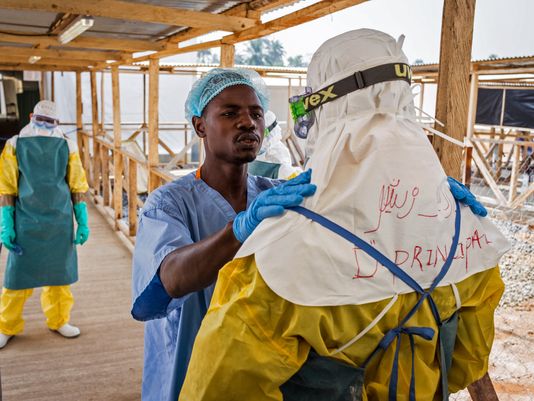The World Health Organization marked a grim milestone Thursday in the biggest-ever Ebola outbreak, estimating that the virus had killed over 10,000 people, mostly in the West African nations of Guinea, Liberia and Sierra Leone.
Fifteen other Ebola deaths also occurred in Mali, Nigeria and the United States.
When Ebola was first detected in March 2014 in Guinea’s forest, officials assumed the deadly virus could quickly be stamped out, just as it had in more than two dozen previous outbreaks, mostly in central and eastern Africa. But health officials now acknowledge they were too slow to respond to this emergency, allowing Ebola to cross porous borders in a region where broken health systems were unable to stop its spread.
A huge global response — including soldiers sent by Britain, the U.S. and other nations — has slowed the deaths from Ebola dramatically, especially Liberia, but the virus appears stubbornly entrenched in parts of Guinea and Sierra Leone.
A look at the Ebola outbreak:
WORLD HEALTH EMERGENCY
WHO declared Ebola an international health emergency in August — but critics have slammed the agency for waiting until there were nearly 1,000 deaths to do so. WHO recently announced it was forming an independent expert panel to assess its response. Ebola cases also emerged elsewhere in Africa, including Nigeria, Senegal and Mali, and small outbreaks were later identified in the U.S. and Spain.
WHERE THINGS STAND: LIBERIA
Liberia, once the hardest-hit country in the Ebola outbreak, released its last Ebola patient on March 5. It has now begun a 42-day countdown and if no new cases are found in that period, it will be declared Ebola-free according to WHO standards. To mark the epidemic’s downturn, Liberian President Ellen Johnson-Sirleaf re-opened the country’s borders with neighboring countries. Ambulances in Liberia have also been dispatched to help stop Ebola in Sierra Leone and the government recently bought a 25-acre plot of land outside the capital to bury Ebola victims
WHERE THINGS STAND: GUINEA AND SIERRA LEONE
Both Guinea and Sierra Leone are still reporting dozens of new cases every week and the number of Ebola deaths taking place outside of hospitals remains high, suggesting that people are wary of seeking help or are hiding cases. In both countries there are still regular attacks against Western aid workers and officials are unable to track where the Ebola virus is spreading.
TRACKING THE TRANSMISSION
Dr. Bruce Aylward, who is leading WHO’s Ebola response, said scientists have sometimes been tracking the wrong people when looking for potential Ebola cases.
“It’s like one of those bank robber movies where the car comes out and everyone follows the wrong car,” he said.
He noted that West Africa’s upcoming rainy season — beginning in April — may make it difficult to get into remote areas. He said last year’s rainy season was when Ebola began to explode, but experts are still not sure why.
“We don’t know if the rainy season in some way affected behavior in the way people moved or how the virus spread,” Aylward said. “But I don’t want to do that natural experiment.”
A LEAP AHEAD FOR VACCINES
The outbreak has had one silver lining — it has sped up the development of Ebola vaccines and treatments, something researchers have been working on for years.
WHO and its partners have already started testing two experimental shots, including a recently launched large-scale study to see if a vaccine can help protect people already exposed to the lethal virus but who haven’t yet developed the disease. Even though the vaccine may come too late to make a difference to this Ebola outbreak, it could prove invaluable later.
“If we (have) a vaccine stockpile for the future, we might be able to prevent (future outbreaks) from turning into what has happened in West Africa,” said Sebastian Funk, an infectious diseases expert at the London School of Hygiene and Tropical Medicine.
Jonathan Paye-Layleh in Monrovia, Liberia, contributed to this report.
–
Source: http://www.usatoday.com/story/news/world/2015/03/12/ebola-west-africa/70218942/







